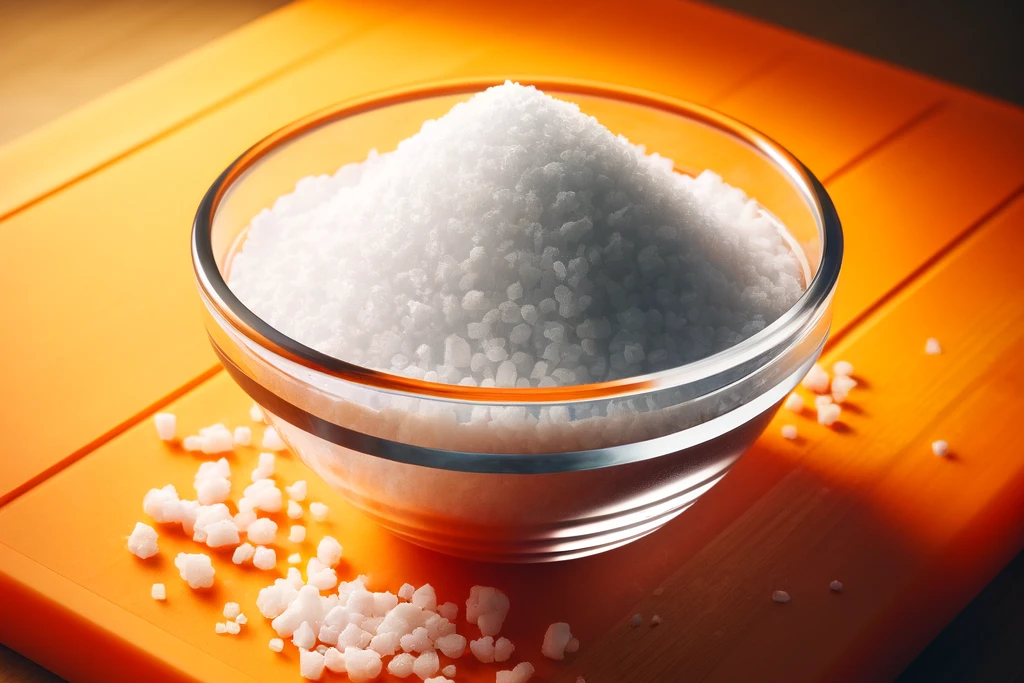Sodium ferrocyanide

Sodium ferrocyanide is a food additive that is used as a release agent for salt. But what exactly is sodium ferrocyanide and how does it affect dogs? In this article, you'll find out what sodium ferrocyanide is, what its benefits and drawbacks are and what you should look out for when giving your dog salt.
What is sodium ferrocyanide?
Sodium ferrocyanide is a chemical compound consisting of sodium, iron and cyanide. Cyanide is a highly toxic salt of hydrocyanic acid, but in sodium ferrocyanide it is very firmly bound to the iron and is not released. This is why sodium ferrocyanide is considered harmless to health.
Sodium ferrocyanide has the European authorization number E 535 and is also called blood lye salt, yellow sodium bicarbonate or sodium hexakis-cyanoferrate. It is a yellow, odorless solid that is easily soluble in water.
Why is sodium ferrocyanide used as a release agent?
Sodium ferrocyanide is used as a separating agent for salt because it influences the properties of the salt crystals and prevents them from clumping together. This means that the salt remains free-flowing and spreadable for longer.
Sodium ferrocyanide is only approved as a food additive for table salt and table salt substitutes and may contain a maximum of 20 mg/kg salt. It is also permitted for organic foods.
What are the benefits of sodium ferrocyanide for dogs?
Sodium ferrocyanide has no direct benefits for dogs, except that it protects the salt from clumping. Salt is important for dogs because it regulates water balance, blood pressure and nerve function. However, dogs only need a small amount of salt, which they normally ingest through their food or drinking water.
What are the disadvantages of sodium ferrocyanide for dogs?
Sodium ferrocyanide also has no direct disadvantages for dogs as long as it is contained in salt in the permitted amount. There is no evidence that sodium ferrocyanide is genotoxic or carcinogenic or that it damages the kidneys. The permitted daily dose (ETD) of 0.03 mg ferrocyanide per kg body weight is considered safe and well below the toxic dose.
However, too much salt can be harmful to dogs because it can lead to dehydration, vomiting, diarrhea or even life-threatening poisoning. Therefore, you should not give your dog extra salt or offer him salty foods such as potato chips or sausage. Even if you give your dog home-cooked food, you should make sure that you don't use too much salt or prefer to use low-salt or salt-free table salt.
Sodium ferrocyanide is a food additive that is used as a release agent for salt and has no direct benefits or disadvantages for dogs. It is considered safe for health as long as it is contained in salt in the permitted amount. However, too much salt can be harmful to dogs and should be avoided.
If you notice any signs of hypersensitivity or poisoning in your dog, you should see your vet immediately. We are not a substitute for a vet, but we try to be as accurate as possible. Every dog reacts differently and we recommend you get a second opinion or consult your vet if in doubt.
Stay healthy and take good care of your four-legged friend!😊
Similar to Sodium ferrocyanide
Sodium citrate (trisodium citrate) is the sodium salt of citric acid, an organic acid that occurs naturally in citrus fruits. It is known for its ability to regulate pH and stabilize metal ions in...
Potassium ferrocyanide is used in the food industry as a release agent, for example for table salt or table salt substitutes. It ensures that the salt does not clump together and flows better. It is...
Calcium hexacyanidoferrate(II), also known as calcium ferrocyanide, is a chemical compound used in the food industry as an anti-caking agent and stabilizer. It is a salt of ferrocyanic acid and...
Sodium carbonate, also known as soda ash or washing soda (chemical formula: Na2CO3), is a white, crystalline powder that is highly soluble in water and forms a strongly alkaline solution. It is...



